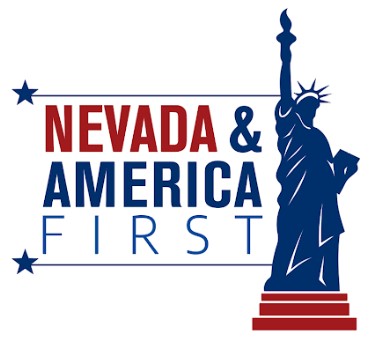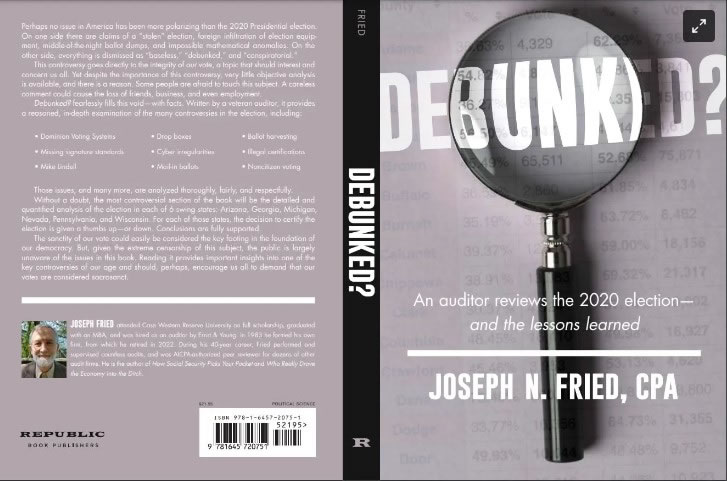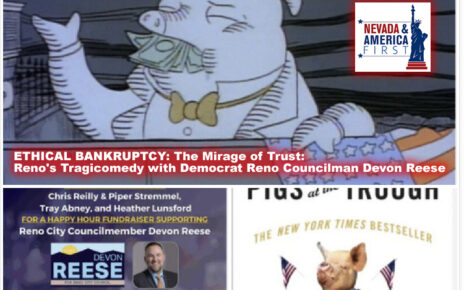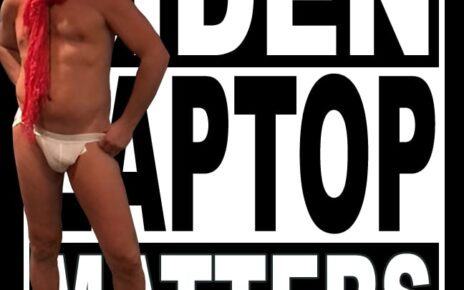It all began last year. I thought I would read some of the election conspiracy theories hurled about on right-wing websites. If I learned enough about those “lies” I might be able to disprove them. That would be done in a book I would call, Debunked. What a mistake!
You see, even for a veteran auditor such as myself, election misinformation is powerful— and dangerous. It produces a type of illness, from which recovery is very slow. And there will be relapses.
That was my situation. I had done far too much election research and was starting to go mad with crazy conspiratorial thoughts. I started to recover, but it required several months and many hours of watching MSNBC. Unfortunately, the recuperation ended with the 2022 midterm election. That is when I was triggered by Nevada’s very slow reporting of election results. The nightmares were back.
Here is my story.
Immediately after the 2022 midterm election, it looked as if Adam Laxalt would be the next Senator from Nevada. But once the excruciatingly-slow vote count began, I started to recall details of the “emergency” legislation passed in Nevada— just a couple of months before the 2020 Trump-Biden election.
Under Nevada’s temporary election law (later made permanent), a voter no longer needed to request a mail-in or absentee ballot; and that was true even if they now resided in another state— or a cemetery. All voters on the registration list would be mailed a ballot automatically. There were reports of hundreds of ballots strewn on payment, left in post offices, and found on apartment hall floors. In fact, one postal worker wondered:
What’s going to happen with these things, they’re not secured at all and there are thousands of them just sitting here?
To vote in the 2020 election, a person could just pick up a few of the extra ballots, sign them, and mail them in. No identification was required, except for a signature. And, if you were a fraudster, you did not need to worry about that: The signature standards were almost impossible to fail. Two county office workers would have to agree that the signature accompanying the ballot differed from the signature in the registration in “multiple, significant and obvious respects” (all three). What were the chances of two people coming to such an agreement?
Prior to the 2020 election, Victor Joecks, an innovative reporter for the Las Vegas Review Journal, had constructed a clever little signature test— one that Nevada failed miserably. He used his handwriting to write the names of several of his friends. Those friends then traced Victor’s version of their signatures onto the ballot transmittals. The results? Eight of nine of these signatures were accepted without challenge.
The new law also created the Nevada “harvester,” who was an unidentified person (homeless person, drug addict, political operative, anyone) who would collect ballots from as many voters as possible. There was no ballot limit, and the harvester’s identity did not have to be revealed.
Harvesters were very motivated because they were generally paid “by the piece.” The more ballots acquired (from voters, from mail boxes, or from trash cans), the more money they made. The harvesters would put the collected ballots in unmonitored “drop boxes,” or they would mail them to the county.
Here is the part Adam Laxalt would find interesting: In Nevada, ballots received during the three days after an election are counted— even if they have no legible postmark. That might be why the reporting of results was taking so long in Nevada. Were political operatives collecting ballots (harvested post-election), and figuring out how many were needed to defeat Laxalt? I don’t know, but I had emphatically told my wife (weeks before the election) that Laxalt would almost certainly lose Nevada— even if he initially seemed to be winning.
After considering Nevada’s 2020 legal changes, I started to remember other strange matters from the 2020 Nevada election. Would similar issues be raised in the current election?
Trump’s attorneys claimed that 3,987 election voters were probably not citizens when they voted. Months after the 2020 election, the Nevada Secretary of State (Barbara Cegavske) admitted that the number of noncitizen voters was at least that high (more than 4,000), and possibly much higher than that (Secretary of State Elections Integrity Violations Report, pg 3). Her estimate of 4,000 was narrowly limited to noncitizen voters who self-identified as such. Was the real number 10,000, 20,000, or more? Who knows?
I remembered the claim that more than 15,000 Nevada votes came from people with out-of-state addresses. Unfortunately, the Nevada Secretary of State refused to check into it. She claimed that there could be valid reasons for the non-Nevada addresses, and the “request to verify the Nevada residency of more than 15,000 individuals is unreasonable” (Secretary, pg. 12)
The Nevada Secretary of State also acknowledged that 18,314 people may have voted twice, but she also said it was unlikely, so “these additional 18,314 allegations did not warrant further investigation” (Secretary, pg. 6).
Secretary Cegavske did not dispute that Native Americans were apparently buying the votes of Nevadans by offering hundreds of dollars of gift cards, gasoline cards, beadwork, and raffle prizes: There was irrefutable evidence. However, the Secretary said it was not her job to investigate (Secretary, pg. 3). By the way, the Native Americans were working with the Biden campaign, according to their promotional materials.
Finally, I recalled that 31,643 Nevada voters had identifying information that did not match corresponding information in the Department of Motor Vehicles. For example, names, addresses, birthdates, and/or license numbers did not match. Whistleblowers claimed that these voters were told they could use out-of-state drivers license information instead of Nevada information (clearly illegal). However, the whistleblower allegations were never checked because they came in the form of sworn declarations rather than sworn depositions— a fine legal argument that Perry Mason would have been proud to make. On the basis of that bit of legalese, the Secretary of State decided that the 31,643 mismatched voters did “not merit further investigation…” (Secretary, pg. 11).
Well, that is my sad story, and now you know why I was triggered by Laxalt’s slow march to defeat. For me, severe election denial sickness has returned.
By the way, I did write the book, and it is called, Debunked, as I originally planned. However, there is now a prominent question mark (“?”) after the title. The book includes an entire chapter devoted to Nevada, and there are chapters pertaining to several other swing states. Recommendations are included.
However, election denial disease is serious: Read the book at your own risk.
Joe Fried is an Ohio-based CPA who has performed and reviewed hundreds of certified financial audits. He is the author of the new book, Debunked? An auditor reviews the 2020 election— and the lessons learned (Republic Book Publishers, 2022). It provides a comprehensive overview of irregularities that affected the 2020 election.
Debunked Synopsis.
Buy here: https://www.barnesandnoble.com/w/debunked-joseph-fried/1142643363?ean=9781645720751
Perhaps no issue in America has been more polarizing than the 2020 Presidential election. On one side there are claims of a “stolen” election, foreign infiltration of election equipment, middle-of-the-night ballot dumps, and impossible mathematical anomalies. On the other side, everything is dismissed as “baseless,” “debunked,” and “conspiratorial.”
This controversy goes directly to the integrity of our vote, a topic that should interest and concern us all. Yet despite the importance of this controversy, very little objective analysis is available, and there is a reason. Some people are afraid to touch this subject. A careless comment could cause the loss of friends, business, and even employment.
Debunked? fearlessly fills this void— with facts. Written by a veteran auditor, it provides a reasoned, in-depth examination of the many controversies in the election, including:
· Dominion Voting Systems · The “Kraken” lawsuits · Missing signature standards · Mike Lindell · Drop boxes · Cyber irregularities · Mail-in ballots · Ballot harvesting · Illegal certifications · Noncitizen voting
Those issues, and many more, are analyzed thoroughly, fairly, and respectfully.
Without a doubt, the most controversial section of the book will be the detailed and quantified analysis of the election in each of 6 swing states: Arizona, Georgia, Michigan, Nevada, Pennsylvania, and Wisconsin. For each of those states, the decision to certify the election is given a thumbs up— or down. Conclusions are fully supported.
The sanctity of our vote could easily be considered the key footing in the foundation of our democracy. But, given the extreme censorship of this subject, the public is largely unaware of the issues in this book. Reading it provides important insights into one of the key controversies of our age and should, perhaps, encourage us all to demand that our votes are considered sacrosanct.
Tarkanian: Rogue GOP Faction Aims to Elect Democrats in Nevada… Again
Interview: Mollie Hemingway On the 2020 Election and Her Best-Seller, Rigged




